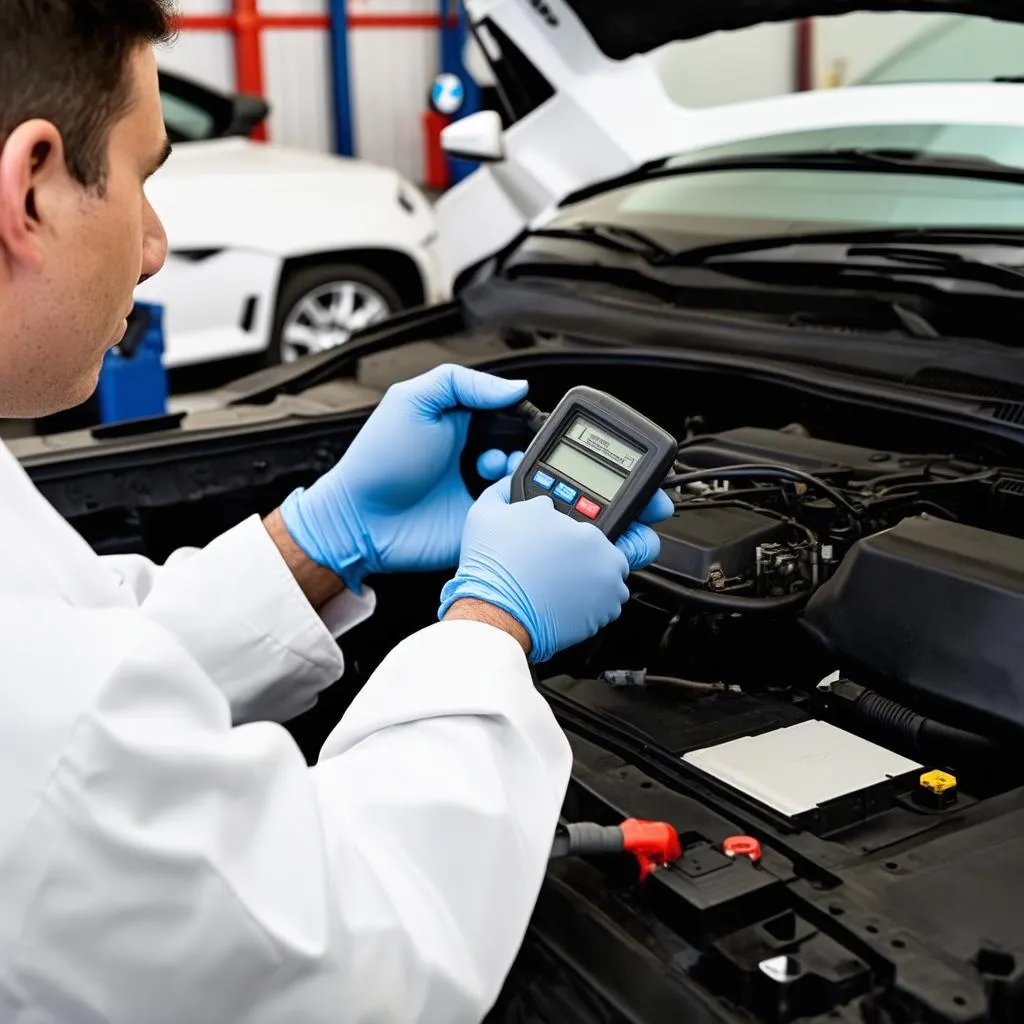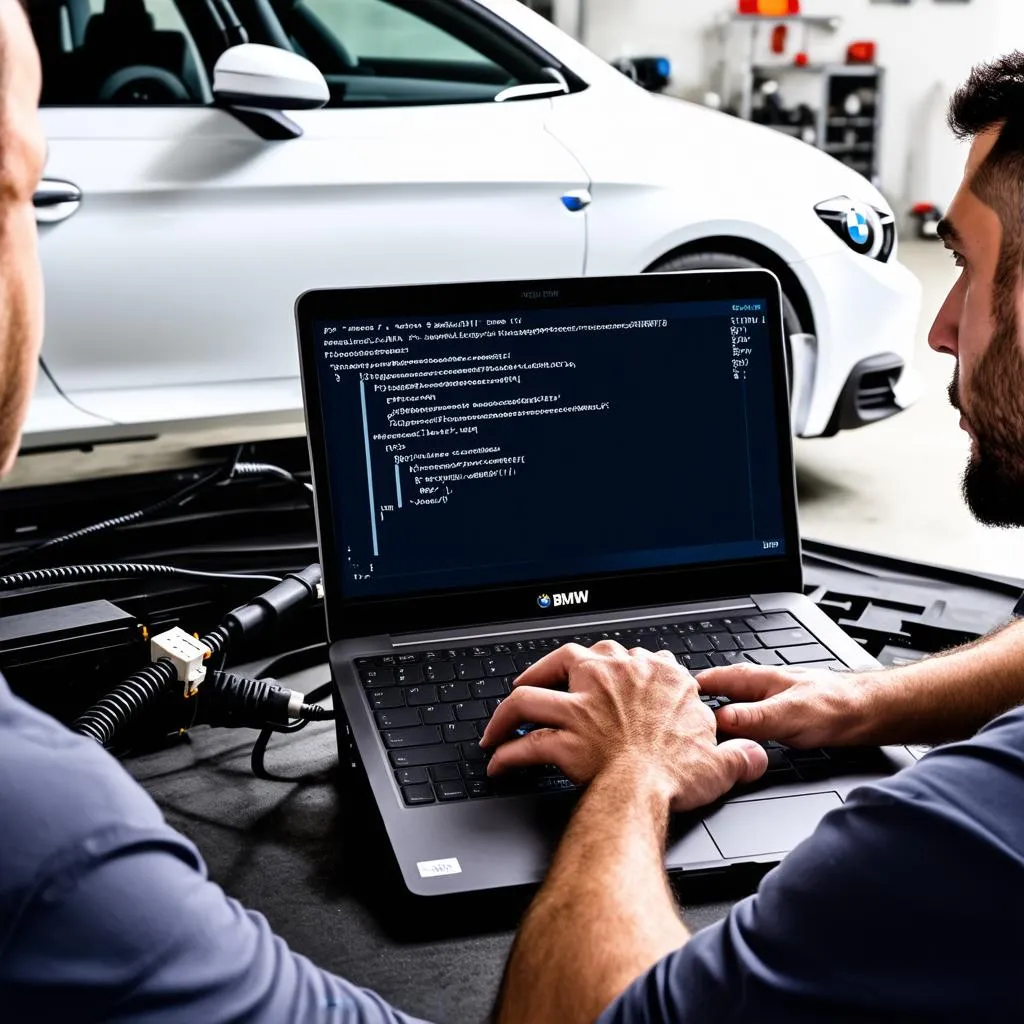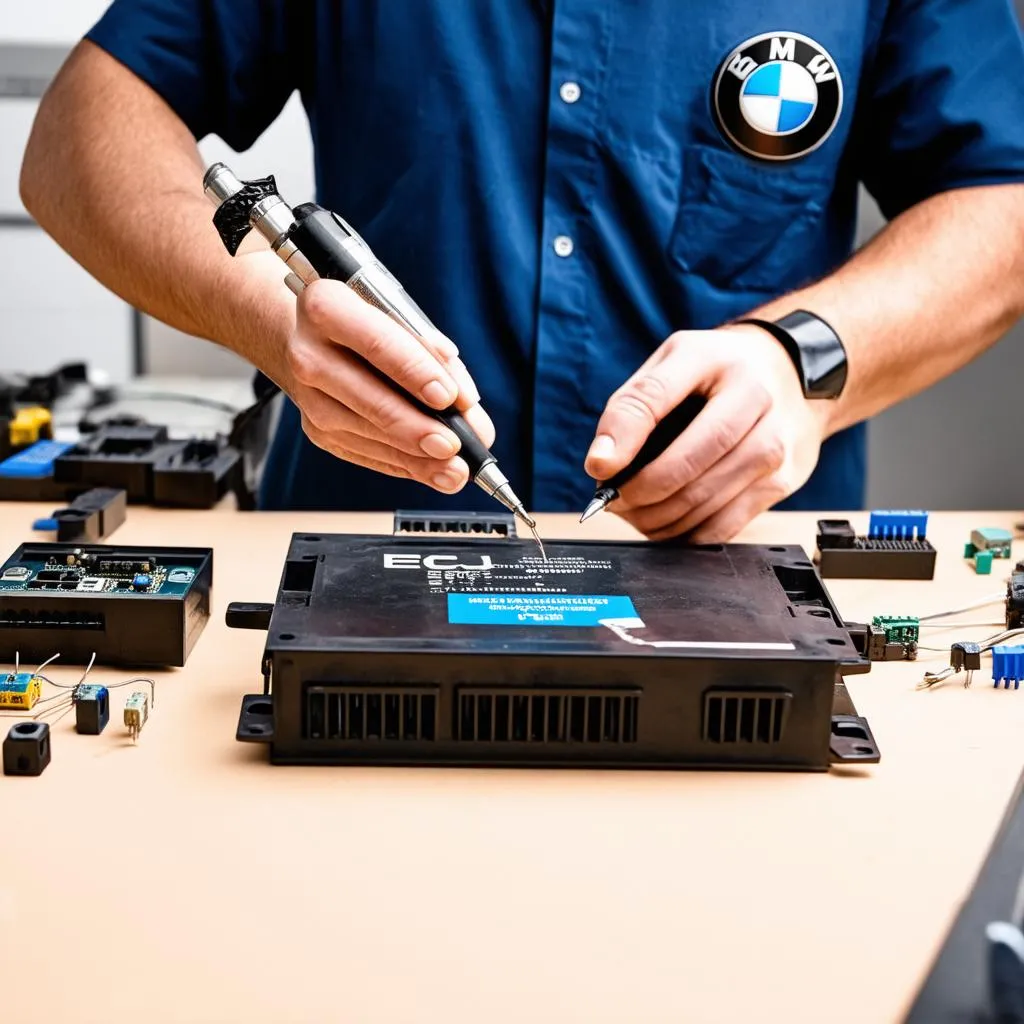Understanding the BMW Engine Control Unit: A Comprehensive Guide
“The engine is the heart of the car, and the control unit is its brain,” as the famous automotive engineer, Dr. David Miller, once said. This analogy perfectly captures the importance of the Bmw Engine Control Unit (ECU) in ensuring your vehicle’s smooth and efficient operation. It’s the central nervous system that governs vital functions like fuel injection, ignition timing, and emissions control, ensuring a perfect symphony of mechanical movements.
Why Understanding the BMW Engine Control Unit is Crucial
Imagine your car suddenly losing power, jerking uncontrollably, or refusing to start. These are just a few of the frustrating symptoms that can arise when the ECU malfunctions. Understanding the role of the ECU in your BMW’s engine is crucial for diagnosing problems, ensuring preventative maintenance, and maximizing your vehicle’s performance.
The BMW Engine Control Unit: A Detailed Look
What is a BMW Engine Control Unit?
The BMW ECU is a sophisticated electronic device responsible for receiving and processing data from various sensors throughout the engine system. Based on this data, the ECU adjusts engine parameters in real-time, optimizing performance, fuel efficiency, and emissions.
What Does the BMW Engine Control Unit Do?
The BMW ECU plays a critical role in:
- Fuel Injection Control: Precisely metering fuel delivery for optimal combustion.
- Ignition Timing Control: Adjusting spark timing for optimal engine power and efficiency.
- Emissions Control: Monitoring and regulating exhaust gases to comply with emissions standards.
- Engine Speed and Load Control: Managing engine speed and torque to meet driver demands.
- Anti-theft System Integration: Protecting your BMW from unauthorized access.
How Does the BMW Engine Control Unit Work?
The ECU functions as a central hub, receiving data from various sensors such as:
- Oxygen Sensor: Measures oxygen levels in exhaust gases.
- Mass Air Flow Sensor: Measures air intake volume.
- Throttle Position Sensor: Monitors throttle position.
- Crankshaft Position Sensor: Tracks engine speed and position.
- Coolant Temperature Sensor: Monitors engine coolant temperature.
Based on the data received, the ECU calculates the optimal engine parameters and sends signals to actuators like:
- Fuel Injectors: Control fuel delivery.
- Spark Plugs: Control ignition timing.
- Exhaust Gas Recirculation (EGR) Valve: Regulates exhaust gas recirculation.
- Variable Valve Timing System: Adjusts valve timing for optimal engine performance.
How to Diagnose BMW Engine Control Unit Problems
Diagnosing ECU problems can be tricky. It involves a combination of:
- Visual Inspection: Checking for visible damage to the ECU or its wiring.
- Code Reading: Using a diagnostic tool like a BMW-specific dealer scanner to read and interpret fault codes stored in the ECU.
- Data Logging: Monitoring ECU data streams for inconsistencies or erratic behavior.
- Component Testing: Testing individual sensors and actuators to identify faulty components.
Common BMW Engine Control Unit Problems
While the ECU is a highly reliable component, it can be prone to issues, especially with age and wear. Common problems include:
- ECU Faulty Wiring: Damaged or corroded wiring can interrupt communication between the ECU and sensors/actuators.
- ECU Internal Failure: Electronic components within the ECU can fail due to heat, vibration, or age.
- Sensor Malfunction: Faulty sensors can provide inaccurate data to the ECU, leading to miscalculations and incorrect engine control.
- Software Glitches: Software bugs in the ECU can cause unexpected behavior or malfunctions.
Replacing a BMW Engine Control Unit
Replacing a faulty ECU is a complex process that should be performed by a qualified technician. It involves:
- ECU Removal: Disconnecting the ECU from its wiring harness and removing it from its mounting location.
- ECU Programming: The new ECU needs to be programmed with specific data for your BMW model and engine.
- ECU Installation: Installing the new ECU and connecting it to the wiring harness.
- System Initialization: Initializing and calibrating the engine system after the new ECU installation.
BMW Engine Control Unit Repair and Replacement Cost
The cost of ECU repair or replacement varies significantly depending on the specific ECU model, labor costs, and the severity of the problem.
- Repairing a faulty ECU: Might be possible for minor issues, but it’s usually less cost-effective than replacement.
- Replacing a faulty ECU: Can range from a few hundred dollars for a generic ECU to several thousand dollars for a genuine BMW ECU.
Common Questions About the BMW Engine Control Unit
Q: How can I tell if my BMW ECU is malfunctioning?
A: Symptoms include engine stalling, rough idling, loss of power, check engine light, decreased fuel efficiency, and unexpected engine behavior.
Q: Can I reset my BMW ECU?
A: Yes, you can reset the ECU by disconnecting the battery for a few minutes. This can clear any temporary fault codes and reset the ECU’s adaptive learning parameters. However, this won’t address any underlying problems.
Q: Can I reprogram my BMW ECU myself?
A: Reprogramming the ECU requires specialized knowledge and tools, and it’s best left to a qualified technician.
Q: Is it safe to purchase a used BMW ECU?
A: Using a used ECU can be risky as it may not be compatible with your specific BMW model and engine. It’s always advisable to purchase a new or remanufactured ECU.
Q: How long does a BMW ECU last?
A: ECUs are typically designed to last the lifetime of the vehicle. However, factors like heat, vibration, and age can impact their longevity.
Q: Can I tune my BMW ECU?
A: Yes, ECU tuning can be done to improve engine performance and fuel efficiency. However, it’s important to choose a reputable tuner who understands BMW ECUs and can perform safe and effective tuning.
Q: What are some reputable BMW ECU tuning companies?
A: Some reputable companies include [insert name of company] and [insert name of company]. They offer a wide range of tuning options and have a strong track record of success.
BMW Engine Control Unit and the Power of Positive Energy
The BMW ECU is a complex piece of technology that plays a vital role in your vehicle’s performance. It’s worth remembering that the engine is a symbol of power and movement, and its control unit plays a pivotal role in harnessing that energy.
Just like positive energy can attract good fortune in life, understanding the ECU and keeping it in optimal condition can empower you with a smoother, more efficient driving experience. Remember to take care of your BMW’s ECU, and it will reward you with reliable performance and many enjoyable miles on the road.
Looking for Expert Help with your BMW?
We understand that dealing with complex automotive problems can be daunting. That’s why cardiagxpert.com is here to help! Our team of experienced technicians specializes in diagnosing and repairing BMW ECU issues. We offer a wide range of services, including:
- ECU Diagnostics: Accurate and comprehensive diagnostics using advanced tools and techniques.
- ECU Programming: Expert ECU programming and calibration services.
- ECU Repair: We can repair faulty ECUs whenever possible, saving you the cost of replacement.
- ECU Replacement: We offer high-quality new and remanufactured ECUs to meet your specific needs.
Ready to get your BMW running smoothly again? Contact us today for a consultation with one of our expert technicians. We’re available 24/7 to answer your questions and provide the support you need.
Whatsapp: +84767531508
Explore More BMW Knowledge
Want to learn more about BMWs? We have a wealth of information available on our website! Check out these related articles:
- [link to bmw-key-holder article] – Discover how to choose the right key holder for your BMW.
- [link to bmw-i3-drivetrain-malfunction article] – Learn about common drivetrain malfunctions in the BMW i3.
- [link to bmw-disa-valve-vacuum-diagram article] – Explore the workings of the DISA valve and its vacuum diagram.
- [link to 2011-bmw-328i-coilovers article] – Discover the benefits of upgrading your 2011 BMW 328i with coilovers.
- [link to bmw-in-limp-mode article] – Understand what causes your BMW to go into limp mode and how to fix it.
Let us know what other BMW topics interest you! Leave a comment below, and we’ll be happy to answer your questions.
 BMW ECU Diagnostics
BMW ECU Diagnostics
 BMW ECU Programming
BMW ECU Programming
 BMW ECU Repair
BMW ECU Repair
